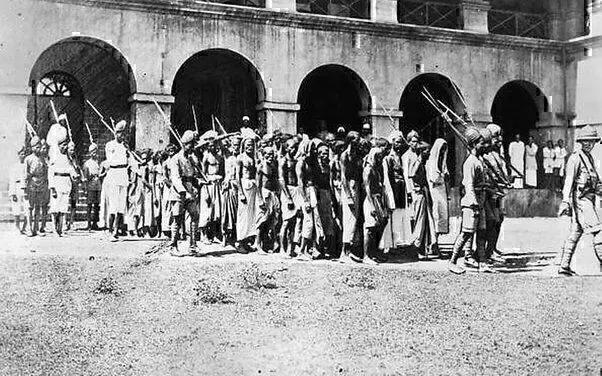
Manjeri's Mappila outbreak of 1849 that went into oblivion
text_fieldsBefore 1921, many years before the mainstream outbreak against feudalism and colonial powers, Mappilas fought against them for several years. The agrarian outbreak which happened 173 years ago is still hidden from the historical pages of Manjeri.
The reason behind the struggle was the increase of tax hikes, fabricated cases, cancellation of agricultural mortgages, and ousting of Mappilas from the possession of the landlords.
On August 25 1849, a Mappila Torangal Unniyaal led by Athan Kurikkal and Kunji Koya Thangal among a 22-member band cut down and murder Teyuni native of Pandalur for the fabricated theft case given against him four years ago. The authority had taken him to custody but the case was dismissed in the absence of evidence. His intention to bar the Mapila Unniyaal by Teyunni has resulted in revenge for the loss of his life.
On the next day, August 26, a Mapila band moved to Pandikad Kodasherry for targeting Marat Namboothiri in his residence Marat illam. On the way, they accidentally met Kannan Nair the caretaker of Namboothiri. The Mappila band member Karutha Unyali was not on good terms with him. Karutha Unlyali had been suspected of having stolen paddy from Namboothiri's field and this incident was reported to Namboothiri by Kannan Nair. But the case was withdrawn by Namboothiri thanks to the intervention of leader Athan Kurikal. Karutha. Unyali shot him and another band leader hacked him down to death.
Another reason was that Mappila band member Neelangara Ali's father Komu had made a mortgage on the property of Marat Namboothiri. But unfortunately, the payment fell into arrears beyond the amount of the mortgage lien which resulted in a suit filed to cancel the mortgage and oust Komu from the possession.
After murdering Kannan Nair, they entered Marat illam. The object of the band was unquestionably an attack on Marat Namboothiri. But he escaped before the Mappila band reached his residence. Even though the band had searched the upper rooms of the illam, they failed to find him. A servant of Namboothiri, Tachu had defended the band with a sword but he was cut down on account of the resistance after that the band wasn't obsessed with any attempt against any one of Marat illam.
After they moved to Manjeri Kacheripadi Karanopad probably known as Rajah. During the time the Mappila band entered the Karnopad temple (Kunnath Temple) there were around 100 people in the audience having the feast of Raja's birthday. The band had fired their gun into the air and in order to go out of the temple, all escaped but a Brahmin priest from Bakal who was deaf and didn't understand the gestures the Mappila band had made, and an act of resistance led to his death. But the unfortunate fate of the priest made the band leader Athan Kurikal regretful and blamed his members for the unfortunate incident and warned them not to repeat it without his consent; then he gave permission to remove the corpse. More members from the inhabited places from Payanad, Nilambur and Porur Nenmini joined the band which rose to 67 in number under Athan Kurikkal.
The chief motive behind occupying the Kunnath Temple was purely economic and social looting of tenants. In Dec 1847 Rajah had decided to set up a new idol and building a new temple was considered with a general renovation plan at the expense of around 1850 rupees. But to meet the expenditure Rajah renewed the documents of the mortgage tenants and cash had to be remitted up front.
This provoked the tenants. Out of the total strength, 214 were Hindus and 311 were Muslims. Only one-third agreed and renewed the Mortgage. This had a two-dimension reason: one, it will imbalance the surplus of the tenants, and secondly, Rajah was collecting the money for purpose of temple reconstruction which was truly a religious purpose in the eyes of Muslim tenants.
On 27 Aug, 5th NI (Native Infantry) and civil police tried to contact the Mappilas but the defence of the band made the authorities call the 43rd Madras NI regiment force from Malappuram and Calicut under Captain Watt, assistant magistrate Collett, Ensign Wyse and they marched to Manjeri. Captain of the 43rd regiment captain Watt commanded ensign Wyse to approach the Mappilas in the temple. They had crossed the field and reached the Temple.
But before the order of the British officer Ensign Wyse, one of the sepoys fired at the Mappila band. That resulted in turning 15 Mappilas against the British force with knives, spears and matchlock which led to the loss of the British officer Ensign Wyse and five sepoys at the hands of Mappilas. And the rest had to run around to Kacheripadi and narrate to Captain Watt about the mishap that occurred. Captain Watt and his sepoys stayed in Kacheripadi and also eventually gave protection to the Manjeri treasury. On the other side, two of the Mappilas had lost their lives in the Athan Kurikkal band and after that, the Mappilas returned to the pagoda victoriously. And bodies of these two Mappilas were interred in the graveyard of Manjeri Mosque.
The tomb of Ensign Wyse, the 43rd Madras Native Infantry British soldier who died in the fight is still in the courtyard of the Boys' High School in Kacherippadi, Manjeri.
After the first unfortunate incident, assistant magistrate Collet had a consultation with Captain Watt and officials to have immediate assistance from Captain Bruce in command of 39th NI from Palaghat and two companies of 94th Regiment Kannur under the command of Captain DenisMercer and Dr Penny, Medical-in charge without any delay. During that time, the Mappila band had destroyed the entire document which Rajah kept in the temple. Moreover, under these circumstances, the Mappila band sent agents to the office to come to the temple for the discussion on the issue and even they collected food from nearby places and returned to the temple safely. This indicates that the area was most equipped with its natural resources and facilities for defence. Even Mappilas sent a message to Tehsildar for cold betel leaf, saying that unless they got it they would burn Kacheripadi. After consultation with the officials, the Tehsildar sent cold betel leaf to Mappilas.
On Sep 3, the British troops arrived in Manjeri with a total strength of 300 but at the time Athan Kurikal had arranged a ferry from Chittathu Parakadavu, a place called Anakayam near Manjeri, and the Band crossed the river and arched to Perinthalmanna Angadipuram temple. The British troops easily obtained the intelligence about Mappila band and they followed the band. After arriving in Angadipuram Temple, Mappilas burned the entire document in the same manner they had done in Manjeri before.
The British force followed them intelligently on Sep 4. But as Mappilas were aware earlier of the British troops' approach and even though they could escape, they didn't. By then, they had left the temple and moved to Tiroorkadu against the British troops in advance. The Mappila band dashed against the British troop with knives, and spears and even they charged against the gun courageously without even any weapon. This resulted in the loss of 64 Mappilas and in return 94th Regiment Private Thomas Blake and Private James Hart got killed and Major Denis, Lieutenant Vaughan, John Hart and 39th Regiment NI Private Shaik Doidi and four more got slightly or severely wounded. Only one Mappila named Moideen, an inhabitant of Kuttachessy only survived. All the "martyrs" bodies were dumped into Angadipuram Thalook Kacheri. Officials had identified only 56 martyrs and the other eight names were not ascertained.
The writings of band leader Athan Kurikkal which were found in the Kunnath Temple give an insight into how social and economic factors were shattered by the British and landlords towards Tenants. The government was ignorant of the intensity of grievance that the Muslims inhabiting the land part of Malabar have been suffering for years. The police, with the indulgence of local landlords, fabricated false charges to target even wealthy Muslims and tenants. Some Muslims in order to avoid complaints of this nature had been under the necessity of giving large sums as bribes which resulted in all these Mussalman being reduced to a state of beggary.
Later, in the year 1857, Achathodiyil Athan Moyin wrote a ballad about the Manjeri outbreak which was popularly known as Manjeri Ballad that was later banned by the British government and the composer was arrested for 3 years and released on bail for two persons.
The outbreak of Manjeri was not a turmoil that sprang one day but it had started against the feudal system that had been exploiting tenants for a long time. The average age of the Mappilas who participated in the outbreak was 22, which gives an insight into how youth experienced the suffocation of the suppression from the landlords and the British. The majority of those who took part in the outbreak were those who had been evicted from the land and those who had been imprisoned in cases of fraud. Tenants, labourers, carpenters, goldsmiths, and barbers were also included. They did not have any religious intention but were only there to fight against the social and economic injustice of the feudal system and the British authorities. Because the objective situation of the social and political environment was against all sets of social norms which had on humanitarian grounds.
(The writer is an independent researcher on the Malabar rebellion and has published several articles on the 1921 Mappila rebellion in various newspapers including Madyamam, Suprapatham daily, Siraj, Doolnews and other online portals; he is also the centre head and a senior lecturer at The B-School International, Kottakal )





